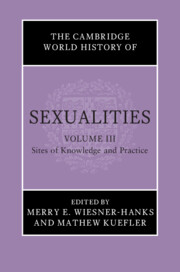Book contents
- The Cambridge World History of Sexualities
- The Cambridge World History of Sexualities
- The Cambridge World History of Sexualities
- Copyright page
- Contents
- Figures in Volume III
- Tables in Volume III
- Contributors to Volume III
- Editors’ Preface to the Series
- 1 Sex in Athens in the Fifth and Fourth Centuries bce
- 2 Sex in Rome in the First Century bce and the First Century ce
- 3 Sex in Constantinople in the Sixth Century ce
- 4 Sex in Chang’an in the Eighth and Ninth Centuries ce
- 5 Sexuality in Baghdad in the Ninth and Tenth Centuries ce
- 6 Sex in Heian-kyō (Kyoto) in the Tenth through Twelfth Centuries ce
- 7 Sex in Iceland in the Fourteenth and Fifteenth Centuries ce
- 8 Sex in Florence in the Fifteenth Century
- 9 Sexuality in Tenochtitlan in the Early Sixteenth Century
- 10 Sex in Sixteenth-Century Istanbul
- 11 Sex in Geneva in the Sixteenth Century
- 12 Sex in Eighteenth-Century Edo (Tokyo)
- 13 Sex in Eighteenth-Century Paris
- 14 Sex and Sexuality in Eighteenth-Century Philadelphia
- 15 Sex in Nineteenth-Century Cairo
- 16 Sexual Pleasures and Perils in Nineteenth-Century London
- 17 Sex in Manila in the Late Nineteenth and Early Twentieth Centuries
- 18 Sex in Lagos from the Mid-Nineteenth to the Mid-Twentieth Century
- 19 Sex in Bombay in the Late Nineteenth and Early Twentieth Centuries
- 20 Sexuality in a Distant Metropolis: Buenos Aires from the Late Nineteenth to the Mid-Twentieth Century
- 21 Sex in Early Twentieth-Century Berlin
- 22 Sex in Sydney in the Twentieth Century
- 23 Toronto the Good, Toronto the Gay: Sex and Morality in the Twentieth Century
- 24 Sex in Shanghai in the Twentieth Century: Intimate Negotiations
- 25 Sex in Twentieth-Century Rio de Janeiro
- Index
- CONTENTS TO VOLUMES I, II, AND IV
- References
21 - Sex in Early Twentieth-Century Berlin
Published online by Cambridge University Press: 26 April 2024
- The Cambridge World History of Sexualities
- The Cambridge World History of Sexualities
- The Cambridge World History of Sexualities
- Copyright page
- Contents
- Figures in Volume III
- Tables in Volume III
- Contributors to Volume III
- Editors’ Preface to the Series
- 1 Sex in Athens in the Fifth and Fourth Centuries bce
- 2 Sex in Rome in the First Century bce and the First Century ce
- 3 Sex in Constantinople in the Sixth Century ce
- 4 Sex in Chang’an in the Eighth and Ninth Centuries ce
- 5 Sexuality in Baghdad in the Ninth and Tenth Centuries ce
- 6 Sex in Heian-kyō (Kyoto) in the Tenth through Twelfth Centuries ce
- 7 Sex in Iceland in the Fourteenth and Fifteenth Centuries ce
- 8 Sex in Florence in the Fifteenth Century
- 9 Sexuality in Tenochtitlan in the Early Sixteenth Century
- 10 Sex in Sixteenth-Century Istanbul
- 11 Sex in Geneva in the Sixteenth Century
- 12 Sex in Eighteenth-Century Edo (Tokyo)
- 13 Sex in Eighteenth-Century Paris
- 14 Sex and Sexuality in Eighteenth-Century Philadelphia
- 15 Sex in Nineteenth-Century Cairo
- 16 Sexual Pleasures and Perils in Nineteenth-Century London
- 17 Sex in Manila in the Late Nineteenth and Early Twentieth Centuries
- 18 Sex in Lagos from the Mid-Nineteenth to the Mid-Twentieth Century
- 19 Sex in Bombay in the Late Nineteenth and Early Twentieth Centuries
- 20 Sexuality in a Distant Metropolis: Buenos Aires from the Late Nineteenth to the Mid-Twentieth Century
- 21 Sex in Early Twentieth-Century Berlin
- 22 Sex in Sydney in the Twentieth Century
- 23 Toronto the Good, Toronto the Gay: Sex and Morality in the Twentieth Century
- 24 Sex in Shanghai in the Twentieth Century: Intimate Negotiations
- 25 Sex in Twentieth-Century Rio de Janeiro
- Index
- CONTENTS TO VOLUMES I, II, AND IV
- References
Summary
Berlin is often described as the site of sexual innovation in both popular and scholarly accounts of the history of sexuality in the twentieth century. Particularly in the inter-war period, the metropolis became an iconic symbol of gender-bending nightlife, an organizational centre for myriad movements of sexual emancipation, and a nexus of scholarly efforts to catalogue and understand human sexual comportment and identity. This chapter argues, however, that while there was certainly an explosion of public, literary, and medical interest in sex, sexuality, and sexual identity in early twentieth-century Berlin, the terms ‘invention’ and ‘discovery’ can oversimplify what was actually a very complex and contentious historical process. Focusing on a few examples of the divisions within queer communities – particularly the conflicts between feminist, lesbian, and transgender activists and the arguments emanating from the masculinist branch of the gay rights movement – it tracks how discourses about the morality of prostitution, the social impact of same-sex love, and racialized biological knowledge shaped definitions of citizenship in ways that still resonate and are still debated. It is this debate, rather than some kind of definitive invention of sexual identity, that makes this period relevant for our present.
- Type
- Chapter
- Information
- The Cambridge World History of Sexualities , pp. 440 - 464Publisher: Cambridge University PressPrint publication year: 2024



